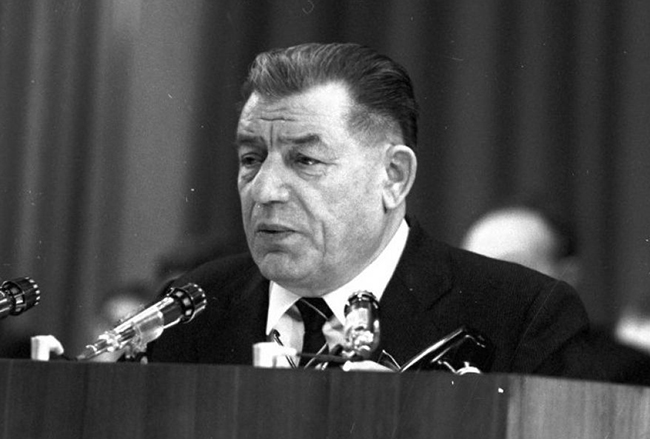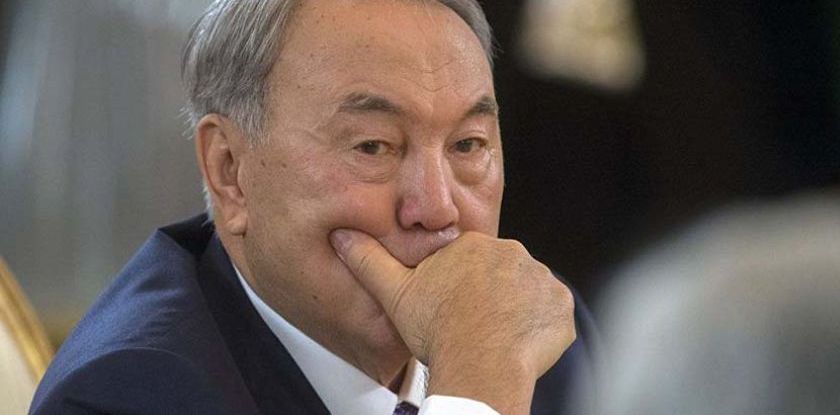Only ten years of party career (1969-1979) was enough for Nursultan Nazarbaev to climb to the top. At the age of 39 he becomes the secretary of the Central Committee of the Communist party of Kazakhstan.
…This year an irreplaceable leader of Kazakhstan Nazarbaev is turning 77 years old. In advance of this date we began publication of his biographical sketch Nursultan Nazarbaev: career, interests, power (first part), written in 2005 by a famous Kazakhstani scientist, history PhD, professor Nurbolat Masanov for the activists of the civic society.
In some ways it is possibly a subjective view at the personality of the first president of the country, but nonetheless, one deserving attention of all those interested in history of Kazakhstan.

Part II: Nursultan Nazarbaev. Ascension to the top
It was the end of Brezhnev’s zastoy, when there was a clear lack of young, energetic leaders in the country. This was especially pronounced in the industrial sphere, since the economy was in deep depression, there was blight everywhere, and there was a rise in understanding of the need for changing of societ-party elite, and need to galvanize to life the falling economic system, in the country.

Nazarbaev’s experience as a party leader of the largest industrial enterprise of Kazakhstan – Karaganda metallurgic plant was his main trump card. A worker, ethnic Kazakh with experience of party leadership of plant labor force, was something unbelievable.
Nazarbaev’s appointment logically fit into the managerial concept of the time, when the first secretary of the CC of Communist part of Kazakhstan, D. Kunaev, fearing real opponents, preferred to advance either young Komsomol candidates, who haven’t gone through all the growth stages, or incompetents.
Kunaev’s prolonged stay at the top has led to the situation where generation of 60 year-olds was about to leave, and he was afraid of 50-somethings like fire, seeing dangerous opponents in them, thus he betted on the youth and has broken the hereditary nature of generations. Striving to fill the vacuum that formed in the soviet-party nomenclatura, at the age of 70-80 he advanced to the top of power, whole slew of young fourty-something candidates – Nursultan Nazarbaev at the age of 39, Zakash Kamalidenov at 44 was appointed in 1980 tot eh position of secretary of CC of Communsit party of Kazakhstan, Kenes Auhadiev – who at 40 years old in 1978 was appointed first secretary of Alamty obkom of party, etc.

Based on multiple evidence of witnesses, Kunaev and Nazarbaev were tired by pretty close relations. Some try to explain it via the clan factor (both were members of the elder juz), some through liking of older party boss towards a young an energetic compatriot, who he viewed almost as a native son and successor, others through Naarbaev’s willingness to show Kunaev his loyalty and usefulness.

Without a doubt, Nazarbaev could learn a lot from his older patron. He took after him, and still uses, such instrument as advancement of young candidates, illegitimate in public eye, without much authority and high level of knowledge, and thus unable to do independent work and not being equal opponents.
He also learned from his boss and patron many other tricks of the party “kitchen” that currently uses. Some of those are the ability to manipulate clan and ethnic factors, tribal relations, clash opponents with each other, make important decision through other people, watch over the strife he himself made. It was then that Nazarbaev learned: personal relations are above principles, professionalism and professional qualities, that any decision can be justified and advanced. But the most important – he learned to use people in his own interests. He acquired a priceless experience of how to fight and neutralize his opponents, how to use both higher ups (Abishev, Kunaev, Gorbachev) and subordinates for his benefit. He learned to tell people what they want to hear from him, and in exchange skillfully sued them for his benefit.
Having come so close to the very top, Nazarbaev has started a through and systemic struggle for the highest management. Unlike his opponents, he never though that power will just fall into his hands, and clearly understood that the moment of luck needs to be constantly drawn nearer. Any means worked for that; he thoroughly worked in all spheres.
The arrival, in the early 80s of young party members into CC of Communist party, has shaken up Kunaev’s entourage, that has sunk in inactivity, nepotism, beshbarmaks and feasts. It led to a sharp rise in competitiveness in the sphere of party nomenclature and exacerbated strife for power, since the departure of Kunaev from political scene in the post Brezhnev period was just a matter of time.
In the backdrop of passive and dependent Auhadiev, Kamalidenov and Mendybaev, not to mention the old nomenclature, Nazarbaev sharply stood out with his passion and endless search for new approaches. He wasn’t afraid to take risks and constantly looked for support within Kremlim rooms, making friends with many useful people at the old square in Moscow.
His efforts proved successful in 1984 when Nursultan Nazarbaev became the chairman of the board of ministers of Kazakh SSR.
From 1979 to 1984 he is the secretary of CC of Communist party of Kazakhstan. In 1980-1990 he is the deputy of the supreme board of the 10th and 11th convention of Kazakh SSR. In 1981-1986 he is a member of Central Revision commission of CPSU. From march of 1984 to july of 1989 chairman of board.
From june of 1989 – first secretary of the CC of Communist party, and from february of 1990 – chairman of the supreme board of KazSSR.
On april 24 of 1990 at the first session of supreme board of KazSSR he was elected President of KazSSR.
On december 1 1991 at the all-state elections without alternative he was elected president of KazSSR.
Since departure of Kunaev was expected ever since Yuri Andropov, who didn’t have time to deal with the former, since he was busy firing Brezhnev’s closest allies – Grishin, Kirilenko, Pelshe, etc. , Nazarbaev was looking for new patrons in Moscow and found them in the face of Tikhonov, Gorbachev etc.

Fight for party leadership of Kazakhstan among young candidates of Kunaev has exacerbated and in the end led to stalemate situation, when Moscow bosses stood before a dilemma of choice between few alternative figures – Nazarbaev, Kamalidenov. Auelbekov etc. The choice was made in favor of a temporary figure – outsider Genadiy Kolbin, for whom Kazakhstan was just a career step.

With time Nazarbaev was able to show Moscow, that there is no alternative to him in Kazakhstan, having demonstrated qualities of an excellent diplomat and politician and loyal partner. By the time Kolbin was thrown into yet another barricade – as a counterbalance to Boris Yeltsin for the position of the head of Committee of state control, there was no more alternative to Nazarbaev. All of his opponents looked failed and not active enough when compared to energetic, competent and business-like head of the board of ministers, who has acquired a lot of experience of working at republican level,
In 1989 Nazarbaev finally headed Central Committee of communist party of KazSSR.

Practically, from the first days he started scouring employees of the party apparatus of the republic, putting his people on the most crucial positions and sending his opponents into political abyss. In his cadre politics he always betted first of all on his allies. But he wasn’t always successful here. Many times, Nazarbaev’s proteges tricked, betrayed and disappointed him with their incompetence.
Having gone through a slew of lies and disapointments, Nazarbaev stopped trusting anyone and started constantly waiting to be backstabbed. This is why he often overuses same cadre rearrangements.
He doesn’t have much choice. He doesn’t want to entrust the country and the government to outsiders. This is why Nazarbaev’s closest circle functions as an aristocratic system – everyone knows each other well, are friends or married to each other, have common interests or commercial structures, their children and grandchildren have studied and are studying in the same schools and universities, and their relatives know each other well as well. Everyone knows each other’s sins and shortcomings and have necessary information. As a rule, majority of appointments of the highest rank of power are recruited by people from this very close circle of the president.
Next level of administrative persons is as a rule people that are illegitimate in a political sense. iIlegitimate in a sense that they are either non-Kazakhs (Masimov – Uyghur, Shkolnik – Russian) or are of a wrong gender (Korjova, Aitimova, Karagusova, Balieva) or are just functionary people, or there is a blackmail on them out there. For example they may be involved in some corrupt actions or criminal affairs, or they are from the wrong tribe, or they lack necessary qualities (charisma) for a sustainable and independent participation in the political process, or they are simply to young, or are outsiders, etc.
The furthest removed circle of power – is just hired legionaires who are not let too close to the highest echelons of power, and are used for various dirty affairs. They aren’t independent but are needed and are useful. Among them are technocrats, without whom not a single system can function, also just simple workers who are pulling the weight, among them are regime-connected people, managers. “orgoviks” and others. They are easily sacrificed, since there is also a surplus of legionaires. They are always politically loyal and disciplined.
It is hard to speak of the struggle for power that happened in 1984-1986 – many events, reasons and results are unclear. Not all heroes of the time behaved honorably, defending theirs and seizing others; it is believed that when the archived, both government and private will be opened (not today or tomorrow but they will be), then we could learn the truth or part of the truth.
To be continued.




